Ying Zheng, Co-Founder and President, AiFi Inc., an AI platform that enables retailers to affordably deploy and scale autonomous shopping solutions across their businesses. Ying is an entrepreneur and a computer scientist specializing in computer vision and AI. She received her PhD in computer vision from Duke University and EMBA from Stanford University. From a young age she attended worldwide programming contests, winning championships and receiving recognition as one of the best programmers in the world. After working at Google and Apple as a senior research scientist, she co-founded AiFi, with a mission to bring ultimate efficiency and enjoyable experiences to shopping. Since then, she has been leading the team to push the frontiers of computer vision technology and empower worldwide retailers to automate all stores of the future. Today, AiFi has become the world’s largest autonomous store platform with over 80 stores operating globally, surpassing Amazon Go.
What does “entrepreneurship” mean to you?
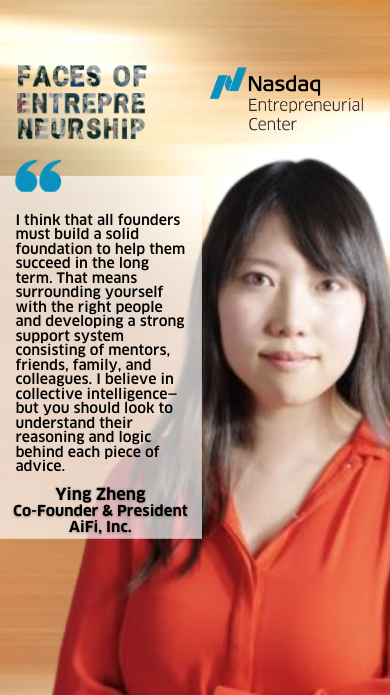 Ying Zheng: Entrepreneurship is about creating values and challenging the status quo. I am committed to changing the retail world and simplifying people’s busy lives with AI. Americans spend 37 billion hours each year waiting in line, and I hope people can save that time for the more important things in their lives.
Ying Zheng: Entrepreneurship is about creating values and challenging the status quo. I am committed to changing the retail world and simplifying people’s busy lives with AI. Americans spend 37 billion hours each year waiting in line, and I hope people can save that time for the more important things in their lives.
Tell us about your first experience with entrepreneurship. What is your company’s origin story? What is the biggest reason you started your business?
YZ: I loved competitive programming contests growing up. I won several regional championships in Asia and came in 15th place in ACM’s global International Collegiate Programming Contest. Competitive programming taught me one thing: there is always a solution that is faster, more efficient, and more elegant. It takes lots of practice, brilliance, persistence, and teamwork to make it work. The path moving forward is sometimes not obvious but is worth the effort. I studied computer science at Fudan University in Shanghai and then continued my studies at Duke where I completed my Ph.D. From there I did my share of research and software engineering at tech companies like Microsoft, Apple and Google before I co-founded AiFi with my partner Steve Gu.
I made the leap to founding AiFi because I care deeply about efficiency. As a working mom, I have to get things done quickly so that I can spend more time with my family. Waiting in lines for baby formula, taking an hour-long detour for essential daily items, and standing idle in grocery stores, can consume a significant portion of my time, which is very frustrating. As a computer scientist who is well versed in, and enjoys improving, system efficiency, I am always thinking about how to use state-of-the-art technologies to save people’s time and thereby improve their quality of life.
What did those early days look like and teach you?
YZ: The early days were characterized by a fast-paced and ambitious mindset as we set out to conquer the autonomous retail space through our AI technology. In the first few years of building our business, our team needed to be adaptive to ever-changing conditions both on the technical and business side, constantly exploring new and different approaches to train the AI. In addition to that, we were also trying to provide the technology’s market value, which was quite a hard feat to achieve. During those years of exploration, we treated this like the biggest science experiment any of us had ever attempted, having a blast along the way as we built AiFi up to what it is today.
What do you wish you knew when you started? Is there anything you would do differently?
YZ: I wouldn’t say I would do things differently, as the early years of not knowing everything only pushed me to explore and test more. However, it would have been helpful to have more mentors to guide me on issues related to governance. With the right mentorship, you are better equipped to navigate the growing stages of a company and I feel fortunate to have great advisors in different fields to share their valuable suggestions and experience. We are also lucky enough to have a strong baseline of great investors that allowed us to grow and achieve our ambitious goals.
What does “success” look like for you? We’d love to hear your biggest, boldest dream? What do you think will help you achieve it?
YZ: As a computer scientist, my biggest dream is to see the major impact AI can have in pushing forward human intelligence and the value it can bring into peoples’ lives by reimagining the personal shopping experience. Success means creating a new, convenient way to shop not only in a grocery setting, but also in travel, sports, and leisure settings. Travel can become less stressful by saving people crucial time that can be spent waiting in long lines, and in leisure activities like sports events or concerts, autonomous shopping can allow them to focus fully on the experience. As we work to advance our technology to push forward human intelligence and get closer to that vision, I see how collaboration between teams and a constant learning mindset can help us work better and faster. Beyond that, maintaining an active imagination and strong sense of curiosity can also help us turn that dream into a reality.
What is your superpower as an entrepreneur?
YZ: Making impossible things possible through imagination and a “never stop learning” attitude. Being a fast learner ever since I was young, pushing the limits and finding unique ways to make things work was something that always drove me to achieve more.
What is your proudest and darkest moment so far? Share a key high and a key low from your journey if you can.
YZ: The proudest moment for me was when we became the largest autonomous shopping network globally. In moments like that, you realize you have achieved a great milestone. I’m incredibly thankful for our teammates who helped bring us there as well as the supportive group of investors and strategic partners we have. One of the challenges I’ve faced in this journey was in the early days, when we began developing our AI without seeing any immediate progress. However, challenges allow us the opportunity to grow and push beyond our limits, so we’ve learned how to think outside of the box and work better as a team through challenges such as this one. Believing in what we were building and putting in that extra effort collectively led us to conquering that obstacle.
What are your personal driving principals, your top values?
YZ: Creativity is one of the things I value most in this life. I love the process of creating something that’s completely new and valuable to people’s lives. Even while I was in school studying for my PhD, I immersed myself into AI and deep learning and found new ways to express my creativity through that, which eventually extended into my work with AiFi and career overall.
What’s it like to work alone or with your partners?
YZ: As an entrepreneur, I am responsible for a variety of people, from team members and partners to financial investors, which can at times feel very lonely while you’re working on your vision. I have been fortunate enough to build a company with my partner and co-founder, which is not something that many people get to say. Although we each focus on different aspects of the business, we also make sure to work together when we need to solve major challenges and problems.
What is a problem that keeps you up at night?
YZ: This isn’t a problem per say, but one thing I’m constantly thinking about is how we can innovate in our field to differentiate ourselves from others. I always strive to find that focus and that “a-ha” moment where you know you’re onto something good.
Do you have a mentor? Tell us about what makes them valuable to you and your business?
YZ: I like to learn from entrepreneurs and industry experts. For instance, Yuting Kuo, the founding member of Microsoft Azure’s computer vision team, has inspired me with his leadership style—to be a cheerleader for my team. I also like to turn to retail leaders like Oz Ozturk for advice—I have learned to build strong partnerships through open communication about where we are in product development and successfully brought on happy and supportive clients.
What role does mentorship play in your world (as a mentor or mentee)?
YZ: I think that all founders must build a solid foundation to help them succeed in the long term. That means surrounding yourself with the right people and developing a strong support system consisting of mentors, friends, family, and colleagues. I believe in collective intelligence—but you should look to understand their reasoning and logic behind each piece of advice.
It is also important to make yourself available for others. I like to use my experience and knowledge to bring people together. For instance, funding can be a challenge for early stage startups and first-time founders. I think that all some founders need is someone to connect them with the right resources and the right people. I try to be that person by connecting other entrepreneurs with the right mentors, investors, and partners.
Have you raised outside capital so far? If so, what kind of outside capital have you raised? What made you choose that route?
YZ: Yes. We have raised a total of $83 million from VCs and strategic partners including Qualcomm Ventures, Verizon Ventures, HP Tech Ventures, Mithril Capital, Aldi, Zabka, REWE, Cervin Ventures, TransLink Capital, CSC-Upshot Ventures, Plum Alley, Duke Angel Network, Reaction, GS Future, Drive Catalyst, and Evolution.
Where do you meet investors? How has your network helped you raise capital?
YZ: Stanford GSB has a strong and supportive network that has made a major contribution to our fundraising efforts. About half of the funding is through my Stanford EMBA network plus there are several investors supporting women entrepreneurs such as Plum Alley Investments and Neythri Futures Fund.
Many entrepreneurs continue to perfect their daily routines to support their work and greater vision; would you mind sharing your morning routine or a regular ritual that grounds your work each day?
YZ: It is important, particularly for founders who usually tend to spread themselves too thin, to find that balance. For me, I practice meditation in the morning to help ensure I start my day off in the most productive way. It inspires me to work at my best while also reminding me to take care of myself, my family, and my team. Work is never-ending and there will always be more that can be done—, but this cannot be done without giving yourself time to rest and recharge.
What are you reading or have read?
YZ: I am currently reading a history book: SPQR: A History of Ancient Rome. I find it provides a unique perspective for understanding the diversity of human experience by positioning us to see patterns that might otherwise be invisible in the present.
Where do you go for inspiration?
YZ: I look up to outstanding researchers for inspiration. For instance, I admire Jane Goodall for her bravery and persistence, her innovative and transformative impact on human society, as well as her love and compassion for animals. Her unique approach and dedication to field research speak to me on a professional level. As a fellow researcher, I think the way she remained involved in her research by immersing herself in the natural environment is a great approach to be followed by anyone wishing to inspire change in the world.
Do you have a favorite quote, mantra, or words of wisdom to get through the tough days?
YZ: Albert Einstein said, “The true sign of intelligence is not knowledge but imagination.” If you have your dreams set on being a game changer in your industry, you must let your imagination run wild to set larger goals, and then work backwards to build a pathway towards those goals with persistence and teamwork.
How do you think about helping others through your work?
YZ: Helping others is always a top priority of mine, both within the company and externally. For example, I set up bi-weekly meetings with our leaders to discuss projects and help provide direction. Externally, I receive a lot of support from the entrepreneur community, yet I also give back to them by serving as an advisor to entrepreneurs and women in tech, through organizations such as Reaction and Stanford GSB Women’s Circle.
What advice do you have for fellow (and aspiring) entrepreneurs building and leading teams?
YZ: In the beginning, it’s all about the team, big or small, and the effort each member puts in. You need to be adaptive and not afraid of change, as that’s what drives an entrepreneurial spirit. There will always be ups and downs which provide great learnings, however your attitude and how you solve and approach things are the critical factors that will impact your growth. No matter what, have a positive attitude and enjoy the experience.
What kind of an entrepreneur do you want to be known as – as in, what do you want your legacy to be?
YZ: Entrepreneurs, particularly in the tech field, should be able to bring a solution to the table that moves our society forward by making people’s lives easier. There are always real-world problems that need to be solved and entrepreneurs should cut through the smoke and seek out the right solutions. This is exactly what I have been doing, using AI and computer vision technology to simplify people’s busy lives.
Do you have someone you’d like to nominate to be profiled in our Faces of Entrepreneurship series? Please let us know by emailing media@thecenter.nasdaq.org or submit your nomination using this form.
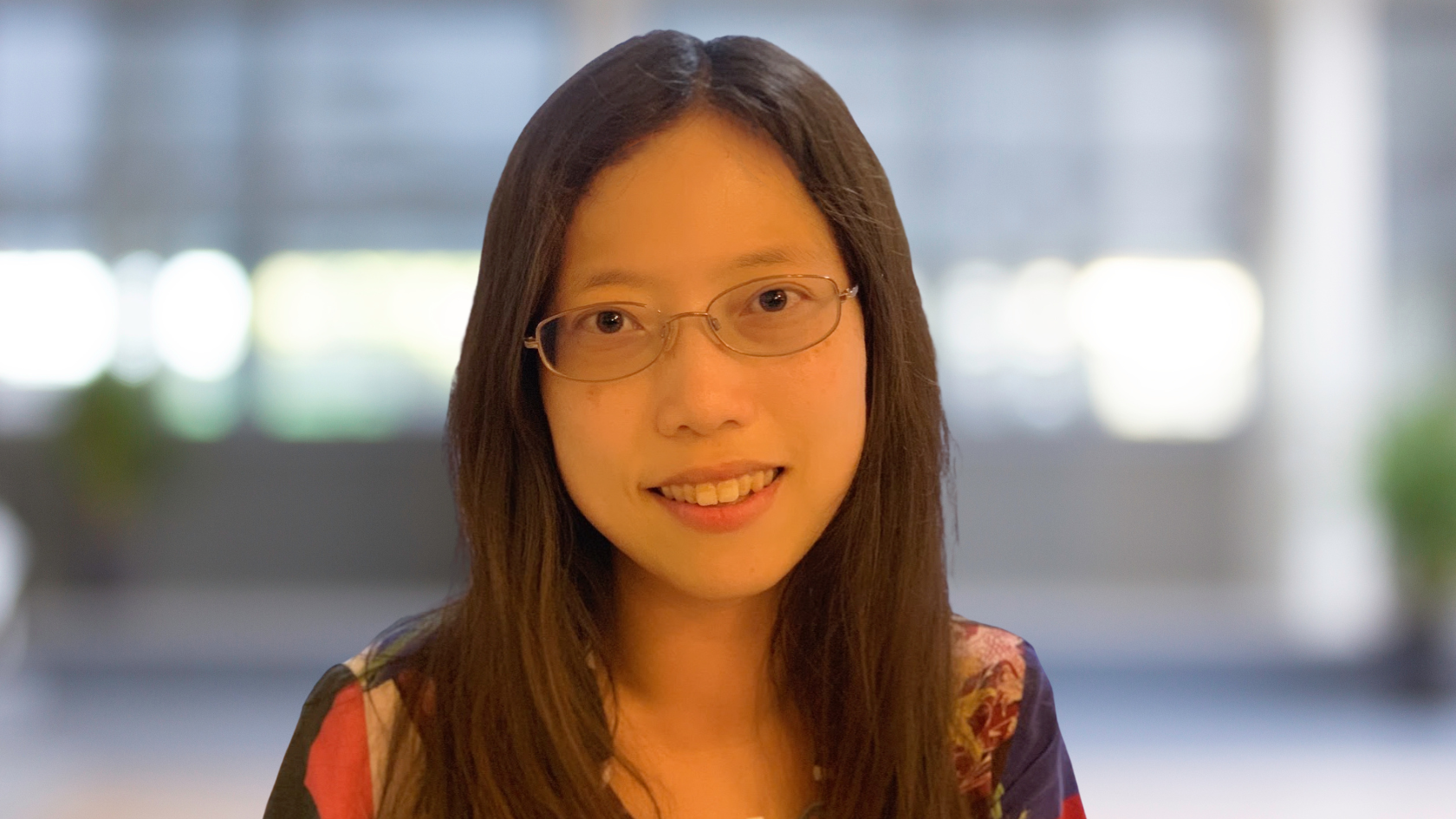
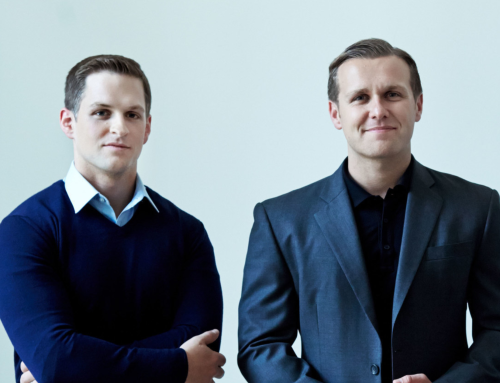
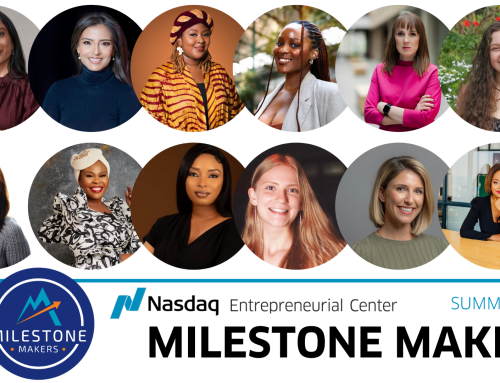
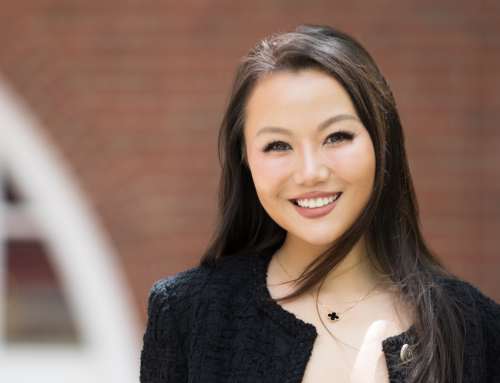
Invite a Friend
Close